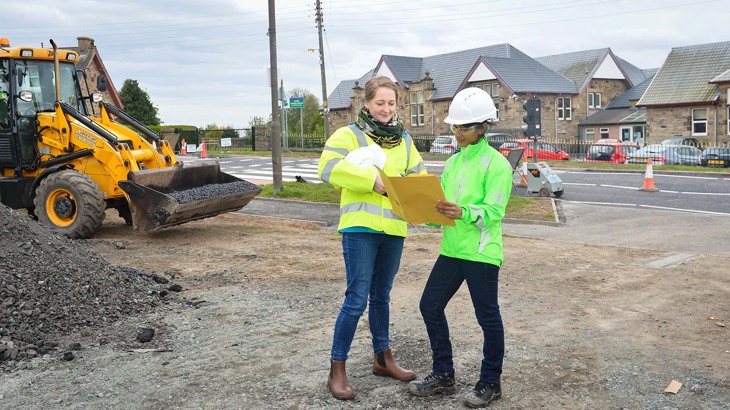Transport is the biggest emitter of Greenhouse Gas (GHG) emissions in the UK. We must reduce motor vehicle use rapidly and fairly. While there is not a single solution, it is clear that building new roads only encourages more people to drive. Here, we outline our position on road building.

Summary
- To meet our obligations in the Climate Change Act and help tackle the climate emergency we need to stop building new, or widening existing, roads.
- Roads funding should focus on maintenance or be reallocated to sustainable modes, including improving walking, cycling and public transport for everyone.
Context
The UK must legally meet our objectives set through the Climate Change Act.
As President of COP26 in Glasgow, there is also a moral imperative to lead the world in tackling the climate emergency.
Transport is the biggest emitter of GHG emissions in the UK. Domestic transport equates to 27% of all UK emissions and the main source of emissions from this sector is road transport.
A transition to electric vehicles, while needed, is not a solution in itself. Modelling suggests we also need to reduce private vehicle use up to 60% by 2030 if we are to meet our targets.
What Sustrans thinks
We must reduce motor vehicle use rapidly and fairly. While there is not a single solution, it is clear that building new roads only encourages more people to drive through ‘induced demand’.
Analysis of road schemes shows that road-building increases traffic by up to 47%, over and above background traffic growth.
We, therefore, need to stop adding to our road network, including building new and widening existing roads, unless this is purely for modes that are efficient and low-carbon now - for example, walking, cycling and public transport.
An immediate suspension and review of all new road projects should take place, following the precedent set recently in Wales.
UK highway authorities should instead prioritise the maintenance of roads, which is likely to increase in cost as climate change brings, for example, more powerful storms and flooding to the UK.
And, work towards network decarbonisation, which should include helping to deliver and facilitate new infrastructure for public transport, walking and cycling.
Funding for road building should be reallocated to sustainable modes.
Our own Bike Life survey showed that far more residents living in cities and towns across the UK support increased spending on public transport, walking and cycling in comparison to driving.
This would serve to reduce transport poverty, improving mobility for the many people who do not drive.
We need to reform planning to minimise the need for new roads associated with house building.
New housing developments that require a new or wider road outside of the development should be reviewed and relocated to more appropriate areas.
New developments should be built within or adjoining existing urban areas to ensure many everyday destinations are walkable from people’s homes and sustainable transport is viable, following a 20-minute neighbourhood approach.
Finally, we need to re-evaluate transport appraisal processes to ensure future decision-making for transport aligns with our climate objectives as well as fully considering other social and environmental costs.
This would help ensure active travel and public transport are prioritised thereby reducing community severance, congestion, and air pollution while improving accessibility for everyone.
The UK government and nation governments must consider all available tools to meet net-zero goals, including traffic reduction targets, road pricing, fiscal levers, transport appraisal and the integration of transport and spatial planning.





